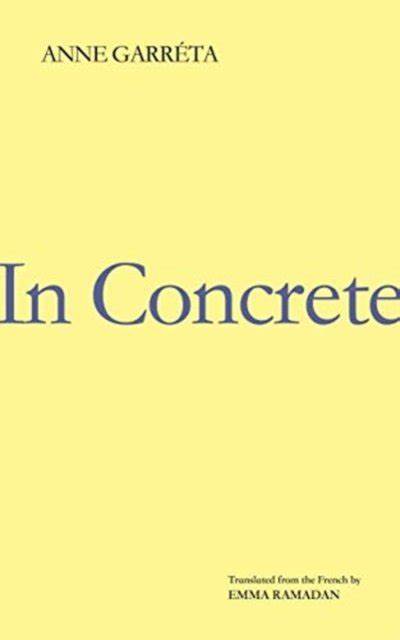by Kimmo Rosenthal

In her second book, Not One Day, which won the Goncourt Prize in 2002, Anne Garréta, having found her literary education woefully lacking, celebrates the moment in her evolution as a writer when literary libertinism was no longer a vice cultivated in secret.
Libertinism usually means unrestrained by authority and convention, often with regard to morals; an older meaning was “extravagant”. All of these apply to Garréta’s use of language, especially in her third book translated into English, In Concrete, where her focus is entirely on the instability and elasticity of language, in fact its lack of concreteness. As Nobelist José Saramago said, “words change their minds just as people do.” Garréta is usually described primarily in terms of her writing about gender and her membership in Oulipo, being the third female member and the first one born after its foundation. Oulipo seeks to unlock the potentialities of writing and language through the use of constrained writing techniques.
Prose as continuous and broad and full as the ocean
This is the kind of prose William Gass called for in his essay The Music of Prose. It appositely describes Garréta’s work. One might imagine her three books being written by different people were it not for her use of language. Her first book Sphinx has the Oulipian constraint that nowhere in the text is there any indication of the gender of the two main protagonists, an imposing difficulty to maneuver around, even more so in the original French with its gendering of words. Its baroque prose at times brings to mind Proust, whom she has written about. In Not One Day, which also deals with gender, desire, and her lesbian affairs, she takes “confessional” writing and the personal essay to task. Her disdain is made clear by referring to it as scraping the bottoms of mirrors. Its practitioners who feel the need to reveal the intimate details of their lives are an orgy of pen pushers pimping their asses. Her erudition, acerbic wit, and singular intelligence are on full display.
Her linguistic libertinism, so to call it, achieves its apotheosis in In Concrete. Garréta, being keenly attuned to the potentialities of form and language, forces us to interrogate and reevaluate our understanding of, relationship to, and usage of language, focusing on its inconstancy. She approaches language in the spirit of fellow Oulipian Italo Calvino, who called for the secret of lightness, la leggerezza.
Convention is the great falsifier
Garréta rails against literary convention in Not One Day, expressing her disillusionment with contemporary writing and contempt for the notion that one should pay heed to the style of the day which is often corrupt. She espouses the slogan that life is too short to resign ourselves to reading poorly written books.
Nowadays erudition, literary allusions, and requiring the reader to have a dictionary handy are seemingly frowned upon, and the expressivity and complexity of language have been sacrificed at the altar of feelings, so-called relevance, and relatability. Already in 2000, Gass railed against lead-eared moralists and message-gatherers, words that could well have written by Garréta. Her contrarian antipathy towards all forms of convention and authority emerges further in In Concrete.
The mechanics of literature
In Not One Day she proclaims, perhaps with an arch smile, that literature takes after mechanics. You see in it neither transcendence or the ineffable. Rather, valves, cylinders, ignitions. The valves, cylinders and ignitions of language and their unpredictability, bad connections, and misfirings are in evidence. I smile and chuckle at pages replete with playful puns, audacious alliterations, nimble neologisms, marvelous malapropisms, and mischievous mondegreens. In discussing the difficulties of translating In Concrete in an afterword, Emma Ramadan describes it as trying to catch an eel in one pond and put it in another. Ramadan gets in on the act herself with her riffing on the word gland, coming up with the neologisms glandicapped, glandsformed, glandemonium.
Fignole, Garréta’s twelve-year older narrator, is the most well-read twelve-year one might find with her literary allusions and expressive vocabulary. How many writers, much less budding teenagers, are familiar with the grammatical terms syncope, apocope, and apheresis? She invokes Conrad’s Kurtz, The horror! The Horror !, as well as Hercules and Augeas.
There is the lovely metaphor of tangled up in the barbed wire of time, and inspired alliteration such as paddling up the choleric, carious creek and sampling sliced-up schnauzer in Sydney. Scatology, certainly of interest to a twelve-year old, arises in the midst of the various scatastrophes with a riddle wrapped in a mystery inside an enema, the misheard farting up the wrong tree, and Caesar, crossing the Rubicon, proclaiming I came, I saw, I squatted. Garréta is not afraid of being blasphemous. Discussing the bladder of time, Fignole muses as to whether God, if he exists, is prostatic and incontinent….with the universe his chamber pot.
At school, she digs holes in grammar and concocts escapes, while calling her classmates petty bourgeois bastards. Today’s woke cooptation of language and the over-sensitivity to others receives her umbrage. The bourgeois think vocabulary belongs to them. One ironic word and they think they are being called moronic. One recondite phrase and suddenly, it’s some dumb slander.
A whirl of verbal gymnastics
Gustave Flaubert, in a letter to Louise Colet while writing Madame Bovary, describes his ideal of the expressiveness and possibilities of prose, exhorting writers to whirl like dervishes in the hubbub of forms and ideas, while strumming their guitars and clashing their cymbals. Garréta’s guitars strum and thrash with clashing, crashing cymbals amidst a whirl of verbal gymnastics, words sparkling on the page, with phrase after phrase evoking sheer delight in the capabilities of language, a true inspiration to my writing.
References
- Anne Garréta, Sphinx., Deep Vellum, 2015
- Not One Day, Deep Vellum, 2017
- In Concrete, Deep Vellum, 2021
- William Gass, The William Gass Reader, Vintage Books, 2019
Kimmo Rosenthal, after a long career in mathematics and teaching, has turned to writing. He has over thirty literary publications and a Pushcart Prize nomination. Recent work has appeared in The Fib Review, The Decadent Review, BigCity Lit, After the Art, Tears in the Fence,Tiny Molecules (Observations) and The RavensPerch.



Add your first comment to this post